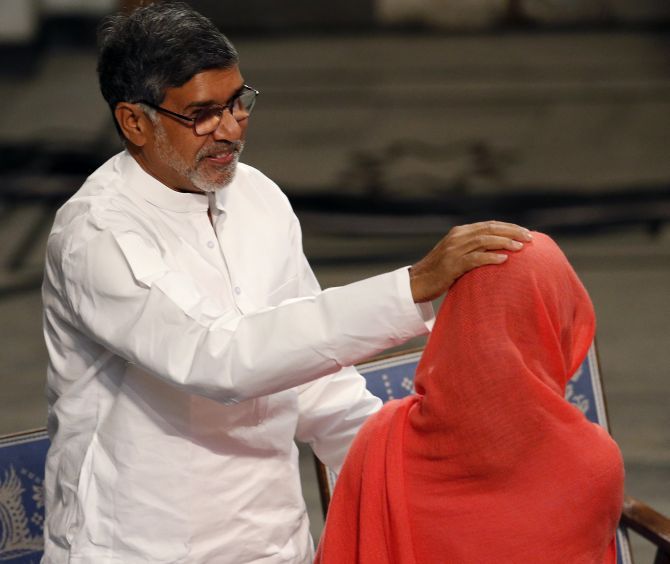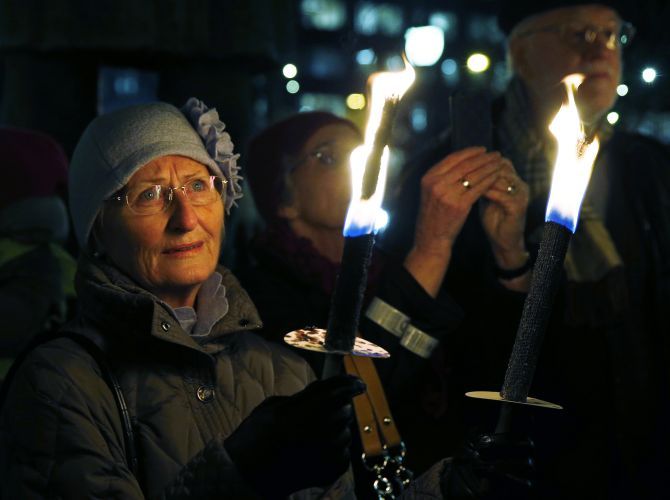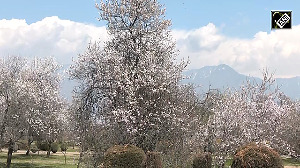‘It is for the first time the voices of the most deferred, the most neglected, the most ignored, the most abused, the most vulnerable -- the children-- has been heard. It is a great moment.’
‘I always wanted Pakistan and India to have good relationships because I believe that this is very important for the development of both the countries.’
‘If children are taught hatred, if they are taught about sectarianism and prejudice, then we can see that there will be terrorism in society.”

Nobel Peace Prize winners Kailash Satyarthi and Pakistan’s Malala Yousafzai were given an ovation after they delivered their rousing speeches in front of a packed audience at a glittering ceremony in Oslo on Wednesday.
A day later, they sit down for an interview with CNN’s Christiane Amanpour and share their dreams, their hopes for the future.
Read excerpts from the interview.
Clearly, Malala and Kailash, well deserved applause and your speeches earlier were really inspirational.
I just want to know what it was like to be up there at that moment, Malala.
Malala: Well, first of all, it was a great honour to be here and to receive this prestigious award, which we all know is an award for peace and it encourages people who are fighting for peace and fighting for human rights, women’s rights, for children’s rights.
So when you see yourself on a stage and people appreciate what you have done and they encourage you, it gives you more strength and gives you more courage.
And when I speak, I just don’t speak to the people in front of me. I believe that there will be millions of people listening to me right now. And I’m going to speak to them and I’m going to tell every child that education is very important for us, for our future generations and we have to stand up for it.
Kailash Satyarthi, you have been doing this for decades. You've been awarded before.
What does this mean to you, the height of the world of prizes?
Kailash Satyarthi: It is for the first time the voices of the most deferred people, the most neglected, the most ignored, the most abused, the most vulnerable people, they are children has been heard. It has been heard at the highest podium of peace and humanity. So, it was a great thing. This is the first time when their voices and their faces have been recognised.
Kailash and Malala, do either of you think about the fact that both of you actually come from neighbouring yet such tense countries?
Do you think it'll have any diplomatic influence?
KS: I don’t know much. Malala can answer better, but I’m sure that it will help in building friendship, trust and deeper relations between the people of these two countries. The children of these two countries who love us, the activists of these two countries who are fighting for the rights of children and rights for education and against child labour for so many years, they feel so empowered. They feel so encouraged.
I’m getting hundreds of phone calls from my friends in Pakistan and, of course, from India. And they are so happy about it. And that relationship is most important for building peace between any nation, between two nations or among many nations in the world.
Does that cross your mind, the idea of the two nations?
MY: Well, I always wanted Pakistan and India to have good relationships because I believe that this is very important for the development of both the countries and we can see that both the countries have this huge percentage of youth, young generation, and we are fortunate -- we both are fortunate countries that we have this young generation. So this young generation needs quality education and we should give them the message of love, friendship, that these two countries are not enemies but they’re friends. And they’re just like a family and tolerance should be there, patience should be there and there should be love for each of us.
Kailash, we know because it was so public, the danger and the almost taking of her life that Malala went through. We don’t know so much about the dangers that you have faced.
Tell us what happened, for instance, when you've been on raids to try to forcibly free indentured children.
KS: Well, I have completely recovered now, but if you look at my body right from my leg to my head, you will find many scars: my left leg was broken, my backbone was broken. I have scars on my head, my right shoulder is broken. So it’s a part of life.
What is it, though? You -- what, people jumped on you? They wouldn’t let you release these kids?
KS: Well, these people are very powerful people. It’s like a mafia operation. They make huge amounts of illicit money. As you know that -- and people know in the world -- that human trafficking and particularly this child trafficking is the third -- or people say it’s the first, biggest illicit trade in the world. It is the biggest black moneymaker in the world.
That makes them as real as the mafia. So when we go to rescue the children anywhere in India or anywhere in the world, the danger is there.

Malala, you were shot at point-blank range. It is truly incredible to see you just going from strength to strength and carrying on your fight.
How difficult do you think it will be to keep taking on those vested interests, the people who don't want girls to have education in your own country still?
MY: Well, that has been my experience for the past 17 years of my life. There are these extremist people who do not want any freedom for women, who do not want any education for girls.
It’s really important that we change the education system. It is important that we talk about education and building schools. But it’s also important what’s written inside those books and what are the children taught.
If they are taught hatred, if they are taught about sectarianism and prejudice and these things, then we can see that there will be terrorism in society. So we need to have an education system in which we teach our children to be tolerant, to be patient and to respect each other’s culture, each other’s religious beliefs and each -- the language we speak or all the things we believe in.
So how do you address those small pockets of people who resent your success, who say that you’re betraying the country, that you’re just doing the work of the West?
MY: Well, education is neither Western nor Eastern. It is every child’s right and I have this dream, the simple dream, to see every child getting quality education. And I know it is very important for a child because we see that children have so many talents, so many skills. And if they don’t go to school, we have lost that child, that child’s childhood and the child’s talent is lost.
So that’s why I want to protect children. But I know that there is criticism and people are allowed to criticise me. But I would like to inform people that we have been doing service in Swat so that we help those girls who are suffering from domestic child labour; they are now getting scholarships to The Malala Fund. We help girls in Shambhala which is my village. And there is no secondary school yet there. So we are helping out there as well.
So I’m trying my best. But people should know one thing. I’ll clarify it, that I’m just a normal human being. I’m no one special. And I do what I can do.
Once upon a time, I asked you what you wanted to be when you grew up. Do you want to go into politics? You have criticised politicians for not doing the right thing.
Will you one day run for prime minister of Pakistan?
MY: I make this wish that I want to become the prime minister and do join politics for a reason, because usually people think it’s such a very thing, I can't even express my wish to seek office of politics. And so I believe that through this field, I can help my whole country. And we need a change in system. If I think about education, there are so many issues that if I want every child in my country to be educated, then I should -- then I need to change the system. Then I need to make sure that we have a proper system there and we are doing what that is needed. For that reason I choose politics. But I'm still 17. I have still a long life -- I hope so -- and I'm hopeful that I will.
My main goal is to serve humanity and to help children to go to school. If I find another good profession for that, then I'll choose that one.
It is truly remarkable, Kailash that you have built these hundreds of child-friendly villages. But, how do you answer those poor people who say that my five-year-old is my bread and butter?
KS: First of all, let me tell you that these five-year-olds are not responsible for poverty. It is the geopolitics, it is the geoeconomy, it is the national politics. It could be the national economy. Eventually, it is the adult people who are responsible for poverty, not the children.
No child on the earth has ever created poverty. No child on the earth has ever created war. No child has ever created any abuse or any nonsense in the life of the people. But it is we who create all these problems, and then the children have to suffer. Children are further victimized for these problems.
So first of all, it is the responsibility of the state, society, businesses, and even the religious institutions to ensure that the children must be protected.

Is what you’re doing and what you’re saying now, are they having an effect? You've talked about, actually, the number of global children in labour and in slavery decreasing. So, are you having an effect?
KS: Definitely. We have seen it. I have been always advocating and working on one -- comprehensive aspect of the problem. That is, we call, the triangular paradigm. The relationship between poverty, child labour, and education.
They create cause and consequences. So, if we have to remove poverty, we have to ensure education for all of our children, quality education, as Malala pointed out.
And also, we cannot bring the children to school until and unless they are free to go to school. Even if you hire teachers, even if you build the schools, even if you do everything, spend money on it, who is going to bring those children to schools?
So, additional efforts have to be made to bring the children to schools, and that work has to be done collectively by the government, businesses, society, NGOs. Everyone should work on this.
You were into your mid-30s a successful electrical engineer. What you brought you to this work? What brought you to cast that aside?
KS: Well, being an engineer is not as lucrative as sitting here on the podium of the Nobel Peace Prize.
And giving a live interview to CNN and millions of people are watching.
That is much more better.
OK. But you didn’t know you'd end up here.
KS: No, I didn’t know. Actually, my father was a simple police constable. My mother was herself illiterate, and I lost my father in early years, so she was a widow. My brothers and my mother had to spend a lot of money in making me an engineer.
That was one of the most promising and lucrative careers those days, and even now. My mother cried, my friends said Kailash has become crazy, mad. What did he drink?
KS: The reason was not that I was working on child labour. The reason was also that child labor was a non-issue. Not only in my country, but globally, there was no strong movement. Even the whole notion of child rights in the United Nations and the international community got shaped in 1989, 90.
So, almost eight, nine years later when I started advocating that it was not simply poverty. It is the denial of human rights, it’s the denial of child rights. So the rights perspective to deal with the issues was not there. So, it was a difficult time.
But I was very keen and very interested in such activities right from my childhood, and I -- as I was narrating the story of my childhood, the very first day of my school was a change for me when I saw a cobbler boy sitting outside the school. And we all were going to school.
And I questioned my teachers, I questioned the father of that boy, and nobody could answer me. They said all these people are born to work. Why are some people born to work and why some people like me born to go to school and have all kinds of dreams and be the engineers and doctors and leaders and what not?
I challenged it then, and I’m challenging it now. I will keep challenging until every single child on this planet receives the best quality education.
Given the present success of what you’ve done, how do you cope with the same kind of criticism that I asked Malala about, certain quarters in your own home country saying that you're just doing the bidding of the West, you're just a post-colonial NGO?
KS: I never bother too much about it, because I never wanted the limelight or media. I work with ordinary people. I’m really an ordinary activist, and I will keep on working like that all my life.
Of course, the media is here and the people are here, that’s true. That’s good for the cause of children. But for me, the more important thing is that children like that, if one single child feels that he's freed, if one single child feels that his life is saved, then it has been worth fighting for.
And we are here talking about thousands and thousands and thousands of children like that. And each time, I free a child, and the child goes back to the mother's lap, a mother who has lost all hope, the child will never come back home, she thought.
And when the first tear of joy rolls down her face, her cheeks, and the first tear of joy, of freedom, appears on the face of that child, I always see the glimpse of God. And that is my worship, that is my religion. And I’m so happy with that. I don’t worry.
Malala and Kailash will split this year’s award of more than $1 million. What do you both want to do with that money?
MY: This money is really important because it can really change the life of some children who are in my village, some girls who cannot get education because there is no school there at all.
So, this money will go to my home, my home of sort in Shangla, and it will be spent there on building schools, especially for girls, because they need secondary education especially.
Other than that, I would like to give a message to all my friends and my sisters and brothers and the world leaders all around the world that it is the time we take action. Let’s not wait.
Let this become the last time that we see a child out of school, and let this become the last time that we see a child suffering from child labour, child trafficking, and child losing his life in war. So, let's bring this change. And we have to unite for it, we have to work together.
And Kailash, what will you do with the money?
KS: This entire money will go for the cause of children. Not only for my organisation, not for me, and not in any organisation where I'm sitting now, but for the cause. And let young people take the leadership.
And also spending that money for the cause of children who are most deprived and who are facing violence and illiteracy. Because they are the heroes.
The very presence of these beautiful daughters and so many other young people around brings hope. But their hope has to be substantiated by strong support from the governments, from the intergovernmental agencies, from the business, from the faith leaders, from the civil society organizations, from everyone.
Because we live in a world where no problem could be solved in isolation. This problem of children cannot be solved in isolation. So, let us begin a new movement for children with the children.











 © 2025
© 2025